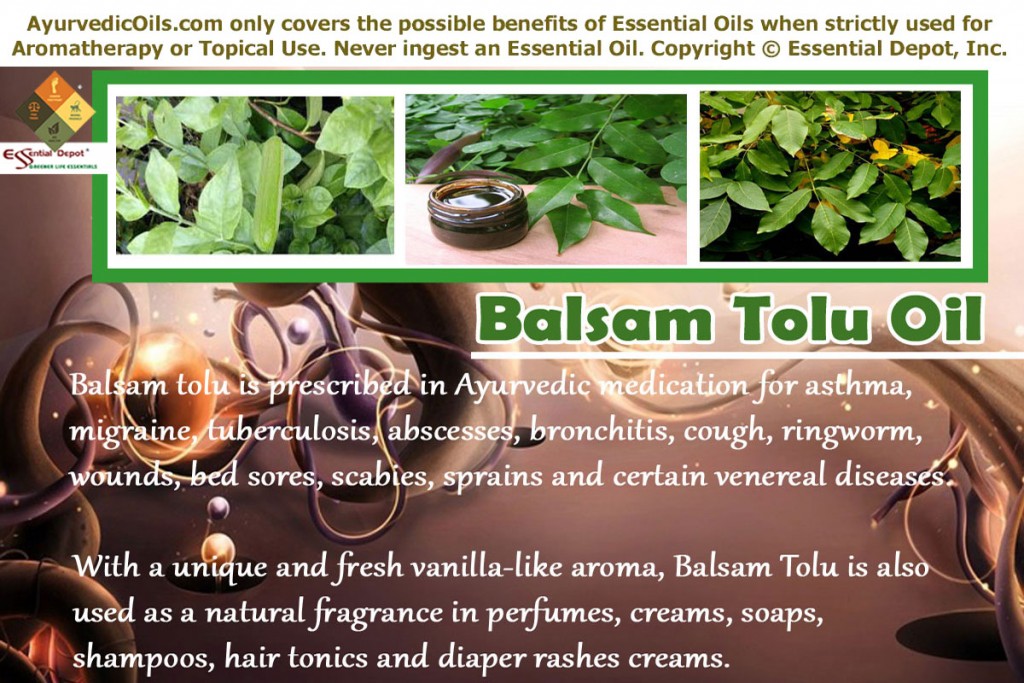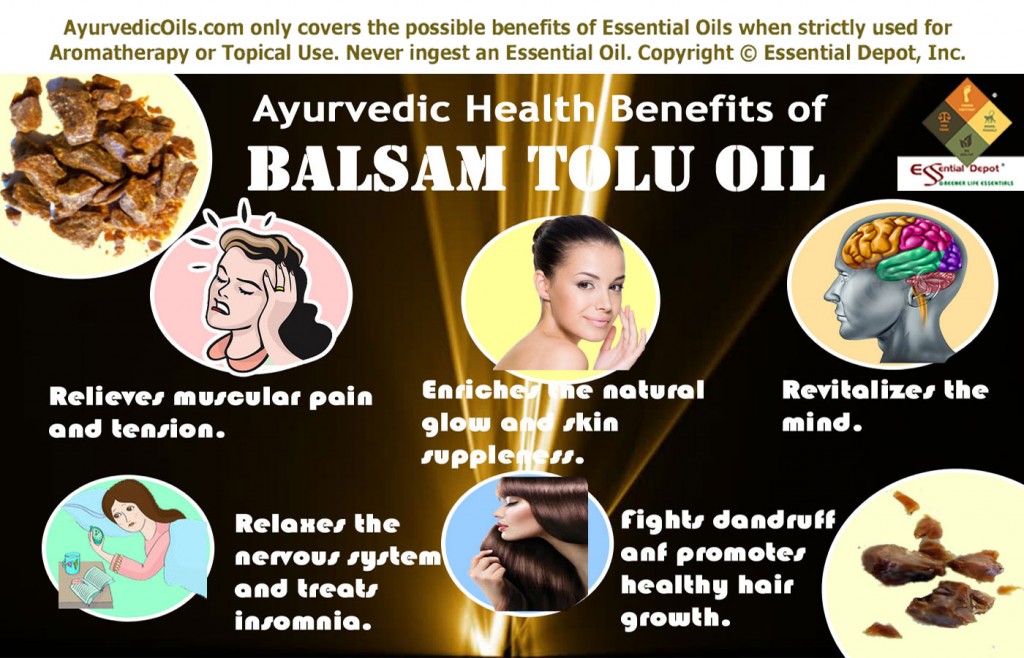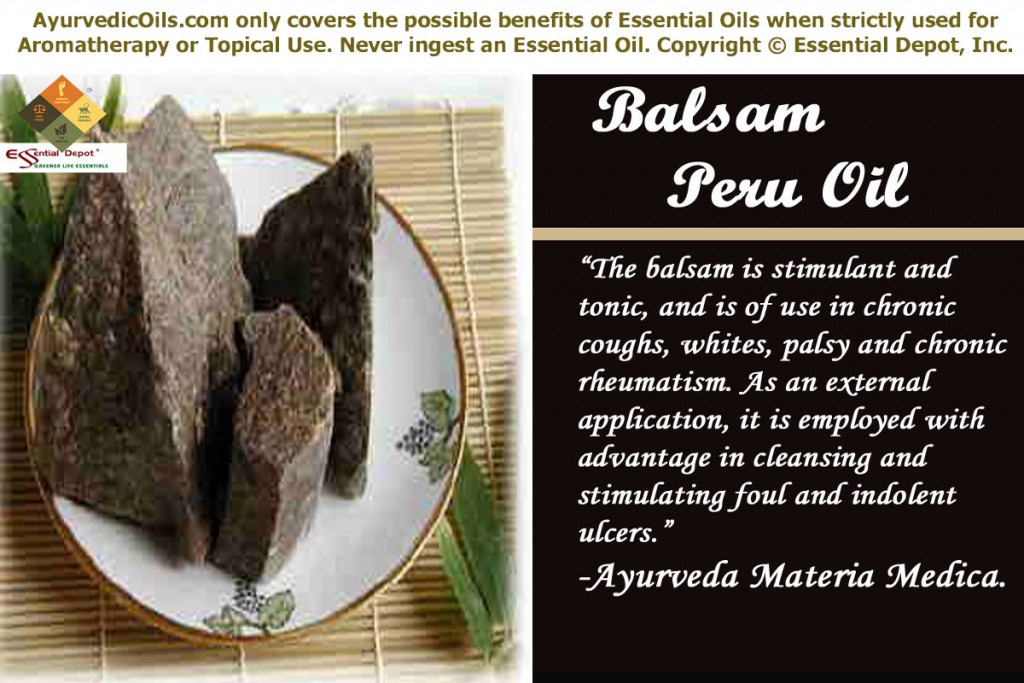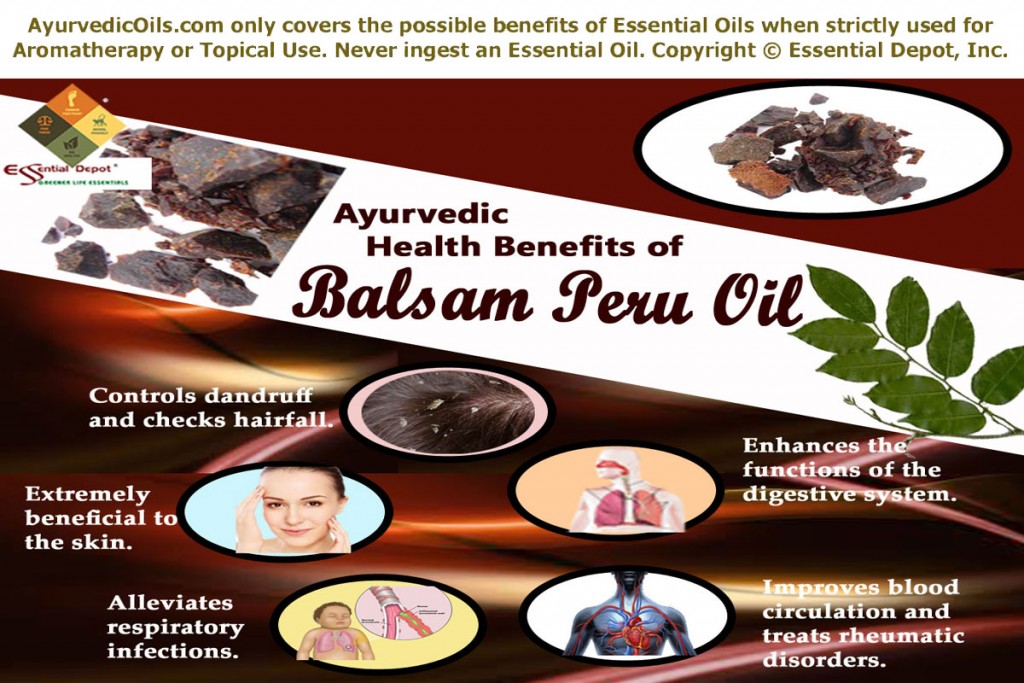
From being a promising remedy for skin ailments for the American and Mexican tribal population to a vital element in popular skin care liniments and cough formulas, Balsam Tolu extracts and its essential oil have traveled a long way in the history of natural medicine. With a unique and fresh vanilla-like aroma, Balsam Tolu is used as a natural fragrance in perfumes, creams, soaps, shampoos, hair tonics and diaper rashes creams.
History is always fascinating and Ayurvedic use of Balsam Tolu indeed owns an interesting history behind its scene. It was the Native Indians who identified the medicinal values of Balsam Tolu during their reign of Peru while they were residing in the South and Central American provinces, where Peru was recognized as the birthplace of the Balsam trees in the ancient period.
Being the traditional Indian medicine, Ayurvedic remedies prescribe Balsam Tolu and its essential oil for asthma, migraine, tuberculosis, abscesses, bronchitis, cough, ringworm, wounds, bed sores, scabies, sprains and certain venereal diseases.
Purchase Balsam Tolu Essential Oil – Wholesale – CLICK HERE
Historical uses and significance of Balsam Tolu essential oil and its other extracts: Botanically known as Balsamum tolutanum, Balsam Tolu is the resin extracted from the Myroxylon tree. It is grown primarily in South America and Central America. This tree has a natural resin producing ability and this resinous Balsam is called by other alternate names including Balsam Peru, Peruvian Balsam, Toluifera pereirae, Myroxylon Balsamum, Indian Balsam, Quina and China oil.
The gummy resin tapped from this tall tree is then made into Balsam and the major exporters of Balsam of Tolu are Columbia, El Salvador and Venezuela. The tribal people from Central America and Mexico used the leaves and bark of the Balsam Tolu tree as a folklore remedy for arthritis, wounds, cold, flu and asthma. The name ‘Tolu’ denotes the tribal race ‘Tolues’ from Columbia and it is said that they used this tree as an ancient remedy for various conditions.
The tribal populace who were aboriginal to the rainforest area used various parts of this tree in the treatment of tuberculosis, wounds, headache, rheumatism, asthma, venereal diseases, abscesses, sprains, catarrh, sores and bronchitis.
Balsam Tolu was first documented in the German Pharmacopeia in the 17th century. The book on “The Essence of Herbs” by Chrissy Brownlyn says “some native Indians used the bark in a powdered form as an underarm deodorant while others found it best for lung and cold ailments”.
It further denotes that the credit of using this plant in pharmaceutical industry goes to the Europeans, especially the Germans who used Balsam of Tolu in treating skin problems like ringworm, scabies, diaper rashes, bedsores, wounds, head lice, dandruff and certain minor ulcerations, after identifying its anti-parasitic, antibacterial and antifungal properties.
The mild and gentle vanilla and cinnamon like aroma of Balsam Tolu oil had supported its use as a flavoring agent in confectionaries, cough syrups, throat lozenges, chewing gums and soft drinks. The mesmerizing floral fragrance of this oil has been prescribed for use in relaxation techniques like meditation and yoga for soothing the mind and calming the senses.
Balsam Peru oil and Balsam tolu oil are extracted from the same tree but by different extraction methods. Even today, Tolu Balsam is used in anti-dandruff shampoos, conditioners, soaps, female hygiene sprays, perfumes, hair tonics, detergents, skin care creams, perfumes, topical salves, ointments, deodorants, surgical dressings, suntan lotions, cosmetics, colognes and certain other medical aids and equipments.
Chemical constituents and remedial properties of Balsam Tolu essential oil:
Among the 25 different chemical components, the major elements contributing to the therapeutic values of Balsam Tolu oil are cinnamic acid, cinnamein, benzyl benzoate, vanillin, nerolidol, cinnamyl cinnamate, benzoic acid, farnesol and other aldehydes. The most important therapeutic attributes of Balsam Tolu oil are antifungal, antiseptic, expectorant, anti-dandruff, anti-stress, analgesic and anti-parasitic.
Ayurvedic health benefits of Balsam Tolu essential oil:
From men in the Stone Age to this Digital Era, celebrate Ayurveda as a boon to mankind for its holistic and regimented approach towards health and harmony.
Ayurveda was gifted to humanity by Acharya Dhanvantari, the ancient God of medicine and is said to have its origin in India, the land of herbs and cultural heritage. This traditional remedy also holds the pride of being a part of Atharvaveda, one among the 4 sacred books of the Indian mythology.
When compared to the modern medicine, where personal care and attention to individuals becomes a question mark, Ayurveda is a divine science that regards and respects human body as a temple where the soul lives in. With this thought of nobility, Ayurveda recommends mankind to keep their mind, body and soul clean, happy and content.
The principles of Ayurveda rely on nature for everything as it strongly trusts that everything on earth is a vital part of nature. The visible proof behind this theory is that all things in nature are made up of five basic elements of nature, namely fire, water, earth, space and air.
Human body is also made up of these five elements, where earth is present in the form of bones and muscles; water represents blood and fluids in the system; air is vital for breathing; space is the soul that dwells in and fire is the essential energy for body temperature, metabolic functions and certain other vital activities of the system.
Ayurveda never goes by the fact that ‘one size fits all’, as it trusts that every human being is a distinctive part of nature composed with a unique individual constitution known as prakriti. It is a combination of three biological energies called as doshas. They are vata, pitta and kapha. Every individual has a predominance of any one of these doshas that acts as a deciding factor in determining the character, personality, attributes and behavioral patterns.
Absolute balance between these doshas as per the law of nature indicates health and doshic imbalances due to climatic conditions, lifestyle changes, irregular food habits and moral vitiations leads to illness.
Ayurvedic healing aims at treating the root cause of an illness instead of its symptoms alone. This aids in curing the disease initially and preventing it in the future as well. Ayurveda prescribes natural remedies that go well with the individual constitution of a person, even if a group of people are affected by the same medical condition.
The prime Ayurvedic remedies are plant essential oils, simple physical exercises, herbs, yoga, prayers, Pranayama (Ayurvedic breathing exercises), meditation, Abhyanga or Ayurvedic massaging, Panchakarma or Ayurvedic detoxification techniques and Ayurvedic routine.
Balsam Tolu essential oil is said to pacify kapha and vata doshas and increase pitta energy. It’s time to look into the Ayurvedic health benefits of Balsam Tolu essential oil. Ayurveda generally prescribes the use of essential oils in the following ways:
 1. As an invigorating massage oil:
1. As an invigorating massage oil:
Abhyanga or the art of massaging with Ayurvedic oils is an important Ayurvedic technique prescribed for healing numerous illnesses since the traditional times. Abhyanga is the traditional method through which the soft tissues of one’s body is maneuvered with the help of fingers, elbows, feet, forearms and other ancient massaging equipments.
Ayurvedic massaging has the potent to pass innumerable benefits to the human body and the key benefits among them are:
- Relieving muscular tension.
- Normalizing the breathing pattern.
- Relaxing the nervous system.
- Revitalizing the mind.
- Alleviating pain and inflammation.
- Improving blood circulation
- Augmenting the natural glow and suppleness of skin.
Ayurvedic physicians generally prescribe the appropriate essential oil based on the prakriti and medical condition of a person. Balsam tolu oil is good to treat vata and kapha vitiations and pitta deficit.
Massaging your system or affected parts with 5 drops of Balsam tolu oil, 2 drops of Patchouli oil, 2 drops of Frankincense oil, 2 drops of Lavender oil, 2 drops of Cardamom oil, 2 drops of Petitgrain oil along with 50 ml of Coconut oil can assist in relieving pain, soreness and inflammation associated with rheumatism, alleviating muscular tension, relaxing the nerves, enhancing the skin texture, improving slow digestion, treating constipation, supporting urination through which the toxic remains in the body are eliminated and promoting peaceful sleep and positive feelings.
Skin is the largest organ of the human body and is the quickest transmitter of remedial properties to the bloodstream. Using Balsam Tolu oil in Ayurvedic massaging aids in passing away its healing values like antioxidant (helps in checking aging symptoms and discard the growth of free radicals in the body), antiseptic, cicatrisant and stimulating properties (supports in enhancing the skin health), diuretic, anti-rheumatic, analgesic values (aids in alleviating pain, eliminating toxic remains by promoting frequent urination, reducing inflammation, redness and stiff muscles) and anti-stress properties that help in relaxing the nerves, mind and induce good sleep.
2. In compress or bathing:
Balsam Tolu oil owns an exotic floral fragrance that makes it an excellent bathing oil that can help in leaving you fresh and energized all through the day.
Using 2 drops of Balsam oil along with 1 drop of Cinnamon oil and 1 drop of Ylang Ylang oil in your bathing water or in warm or cold compress is a great way to recharge your nerves, enchant your muscles, lessen muscular tension, alleviate tension headache, back pain and calm your senses and instill a complete feeling of newness.
A warm bath with this blend especially before going to bed is a great way to promote good sleep without any nightmares.
3. Topical application as creams or salves:
Balsam Tolu has been used as a promising remedy for myriad skin problems since the times of the tribal populace. 2 to 3 drops of Balsam Tolu oil along with 1 drop of Turmeric oil mixed with your mild skin care cream or with 2 ml of Jojoba oil can be applied on wounds, eczema, minor skin ulcerations, acne, scabies, rashes, ringworm, bedsores, diaper rashes and skin infections caused due to fungi and parasites.
The herbal blend of 2 drops of Balsam Tolu oil with 2 drops of Rosemary oil, 2 drops of Ylang Ylang oil and 2 drops of Basil oil along with 10 ml of sweet almond oil, applied on the scalp and hair, followed by a thorough rinse with your mild shampoo can assist in keeping away from dandruff, combat head lice, enrich the scalp and promote the growth of healthy hair naturally.
4. In burner, diffuser or vaporizer:
Ayurvedic texts recommend the use of aromatics or aromatherapy as a major means of natural healing and prevention of illnesses. Smell or aroma has an important effect in balancing and stimulating various functions of the body. This action is performed by the odor-bearing molecules that influence the receptors in the nose while breathing. They reach the olfactory bulb of the limbic system in the form of nerve impulses.
The aromatic molecules of Balsam tolu essential oil has expectorant, antifungal, anti-dandruff, antiseptic, anti-stress, anti-parasitic, analgesic, anti-rheumatic and stimulating properties. When inhaled by adding 2 drops of Balsam tolu oil in vaporizer, burner or diffuser, these molecules containing the therapeutic properties of this oil reach the limbic system.
Following this, the hypothalamus and other vital parts of the limbic system convey the corresponding commands to different parts of the body as per the remedial values. Inhaling the soothing aroma of Balsam tolu oil can assist in relaxing the system, lessening pain, reducing fatigue, treating insomnia, and alleviating stress and depression.
Ayurveda states that using Balsam tolu oil in diffuser or vaporizer specifically during meditation, yoga and Pranayama instills a sacred feeling as the mind is said to reach the most subtle and tranquil α (alpha) state during meditation.
5. In vaporizing ointments or steam inhalation:
Inhaling the medicated steam is a proven natural remedy for alleviating cold, cough, sore throat, headache, sinusitis, blocked nose, watery eyes and migraine pain. Steam inhalation works effectively as the steam aids in bringing out the toxic remains in the body through sweat and one can feel the relief instantly after a medicated steam inhalation.
Adding 2 drops of Balsam Tolu oil along with 1 drop of Peppermint oil and 1 drop of Eucalyptus oil in steam inhalation can aid in relieving headache, opening blocked sinus and nasal passages, soothing sore throat, discarding phlegm and mucus deposits and eliminating the microbes present in the system through sweat.
When added to your vaporizing ointment, this blend can also be helpful in treating bronchitis, tuberculosis, chest congestion, nasal congestion, whooping cough and certain other respiratory infections.
Certain test tube studies have revealed that Myroxylon plant has been effective in inhibiting H.pylori, the general ulcer-causing bacteria and Mycobacterium tuberculosis, which is responsible for lung diseases.
Disclaimer:
This article is not meant to treat or diagnose any medical condition or substitute any professional medical advice. It is only for educational purposes and we are not medical practitioners. This heath related information is shared only with the view of spreading the ancient wisdom of Ayurveda, the oldest holistic healing system on earth.
Never use essential oils for internal purposes. Always remember to dilute essential oils before using it for topical uses, as organic and 100 percent pure essential oils are highly concentrated substances and may lead to allergies, if used without diluting them. Discuss with your healthcare expert/Ayurvedic physician before taking the right call on the most suitable essential oils for your health condition and unique individual constitution. Keep away from Balsam Tolu oil, if you are a nursing or pregnant mother, as it is regarded as a sensitizing oil and may have chances of causing allergic reactions.
Thought for the day:
In nature, nothing is perfect and everything is perfect. Trees can be contorted, bent in weird ways, and they’re still beautiful. -Alice Walker
Suggested Reading:
- Prescription for Herbal Healing, 2nd Edition: An Easy-to-Use A-to-Z Reference to Hundreds of Common Disorders and Their Herbal Remedies by Phyllis A. Balch CNC, Stacey Bell
- 10 Ways to Use Balsam Of Peru (Recipe Book) by Sam Enrico
- The Encyclopedia of Essential Oils: The Complete Guide to the Use of Aromatic Oils In Aromatherapy, Herbalism, Health, and Well Being by Julia Lawless
- Scabies Natural Home Treatment Solution by Alyson Rodgers
- Medical Herbalism: The Science Principles and Practices Of Herbal Medicine by David Hoffmann
Reference Links:
- Balsam of Peru by Wikipedia
- Balsam of Tolu from The Essence of Herbs by Chrissy Brownlyn
- Balsam of Tolu by Infostir.com
- Peruvian Balsam (Myroxylon pereirae syn. M. Balsamum) by Herbs2000.com




